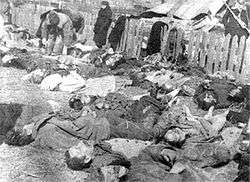Koniuchy massacre
The Koniuchy (Kaniūkai) massacre was a massacre of civilians carried out by a Soviet partisan unit along with a contingent of Jewish partisans under their command during the Second World War in the Polish village of Koniuchy (now Kaniūkai, Lithuania) on January 29, 1944.
Massacre
A small local self-defence unit was created to defend the village against repeated Soviet partisans' raids. The village of about 60 households and 300 inhabitants was not fortified but the villagers were armed with a few rifles. On January 29, 1944, the village was attacked by Soviet partisan units under the command of the Central Partisan Command in Moscow. The raid was carried out by 100–120 partisans from various units including 30 Jewish partisans from the "Avengers" and "To Victory" units under the command of Jacob (Yaakov) Prenner.[1] Men, women and children were massacred indiscriminately and most of the households destroyed. According to the findings of the Institute of National Remembrance (investigation still in progress), at least 38 Polish civilians were killed and about a dozen injured, although earlier reports stated higher numbers of deaths. Notified about the assault, the 253rd Lithuanian Schutzmannschaft battalion soon arrived at Koniuchy but did not find any partisans.[2]
The attack was carried out by the Soviet partisan units "Death to the Fascists" and "Margiris" from the Vilnius Brigade of the Lithuanian Partisan Staff and "Death to the Invaders" of the Kovno Brigade. Following the attack, a message sent from Genrikas Zimanas (Henoch Ziman), head of the "South" Partisan Brigade, to Antanas Sniečkus, communist leader and chief of Headquarters of the Lithuanian Partisan Movement, read as follows: "On January 29, a joint group of Vilnius and Kovno partisans, as well as a special group from General Headquarters burned down the most ardently resistant village of the Eišiškės County, Kaniūkai."[2]
Evaluations and controversy
There are controversies surrounding the significance of the Koniuchy massacre. The events at Koniuchy have been described by Chaim Lazar in Destruction and Resistance (1985) in which he claimed 300 people had been murdered. This number has not been supported by other sources. In Rich Cohen's account of a Jewish partisan unit, which describes the massacre of civilians, Koniuchy is described as a "pro-German" town that was used as a staging ground for German attacks against partisans.[3] In a November 2008 interview with Adam Fuerstenberg, former director of Toronto’s Holocaust Centre, York University professor Sara Ginaitė, a veteran Jewish partisan fighter, described Koniuchy as having a record of hostility to the partisans and that, in collaboration with the Nazis and the local police, the town had organized an armed group to fight the partisans.[4] The hostility against Soviet partisans specifically was widespread as they were weakening and fighting all partisan groups not aligned to Moscow, most notably Armia Krajowa.[5]
In Poland and Lithuania, the Koniuchy massacre is treated as one of many war crimes.[2] The Institute of National Remembrance initiated a formal investigation into the incident on March 3, 2001, at the request of the Canadian Polish Congress.[6] The institute examined a number of archival documents including police reports, encoded messages, military records and personnel files of the Soviet partisans. Requests for legal assistance were then sent to state prosecutors in Belarus, Lithuania, the Russian Federation and Israel.
The Lithuanian prosecutor general subsequently opened its own investigation into the massacre. As part of its investigation, Lithuanian prosecutors have sought out Jewish veterans of the partisan movement, including Ginaitė, for questioning. Also under investigation is Yitzhak Arad, a former Israel Defense Forces brigadier general, Jewish resistance movement veteran, and former chairman of Yad Vashem, who served as a member of a commission appointed by Lithuania's president in 2005 to examine past war crimes. Arad became the subject of criticism by Lithuanian right wing groups after his public recommendation for an examination of Lithuania's role in the Holocaust. An investigation into Arad's wartime activities in Koniuchy was opened by Lithuania's chief prosecutor in the wake of the criticisms of Arad's proposal.[7][8][9]
In May 2004, a monument commemorating the event was erected in Kaniūkai with the names of the 34 victims.
See also
References
- ↑ "Operations Diary of a Jewish Partisan Unit in Rudniki Forest 1943-1944". Jewish Virtual Library. American-Israeli Cooperative Enterprise. Retrieved 2011-03-16.
- 1 2 3 Zizas, Rimantas (2002). "Žudynių Kaniūkuose pėdsakais". Genocidas ir rezistencija. 1 (11). ISSN 1392-3463.
- ↑ Cohen, Rich (2000). The Avengers. A.A. Knopf. pp. 144–145. ISBN 0-375-70529-5.
- ↑ Adam Fuerstenberg. Lithuania asks partisans to ‘justify’ their actions. The Canadian Jewish News. November 20, 2008.
- ↑ "Masakra wsi Koniuchy (29 stycznia 1944 r.)". histmag.org. Retrieved 2016-01-30.
- ↑ Marc Perelman. Poles Open Probe Into Jewish Role In Killings. Group Fingers WWII Partisans. The Forward. August 08, 2003.
- ↑ Lana Gersten and Marc Perelman. Tensions mount over probe into Jewish 'war crimes'. Haaretz. July 08, 2008.
- ↑ Yossi Melman. Nazi hunter: Lithuania hunts ex-partisans, lets war criminals roam free. Haaretz. August 26, 2008.
- ↑ Sara Ginaite. ‘Investigating’ Jewish Partisans in Lithuania. The Protest of a Veteran Jewish Partisan. Jewish Currents. September 2008.
Further reading
- Collection of various letters and reports
- Report from IPN on Poland
- Lazar, Chaim. Destruction and Resistance. Shengold Publishers, New York, 1985.
- Kowalski I., 1969: A Secret Press in Nazi Europe: The Story of a Jewish United Organization. Central Guide Publishers, New York
Coordinates: 54°16′50″N 25°14′40″E / 54.28056°N 25.24444°E
